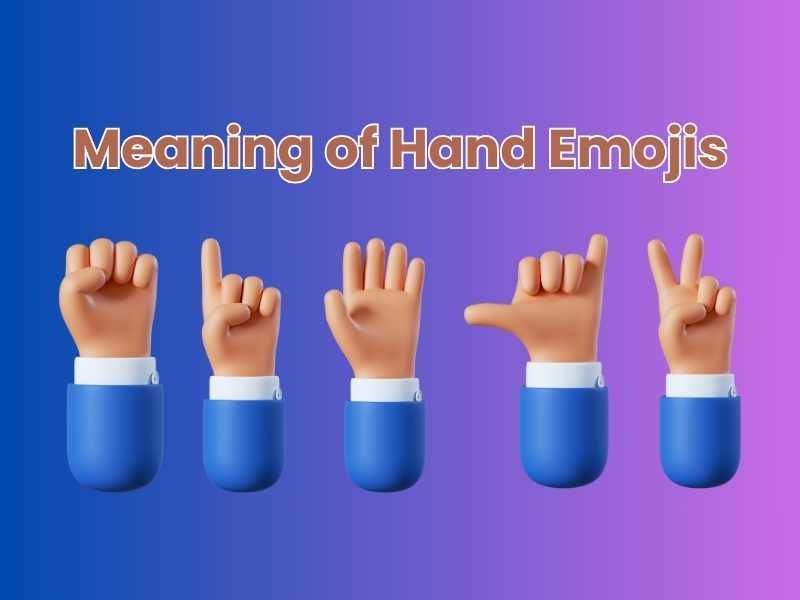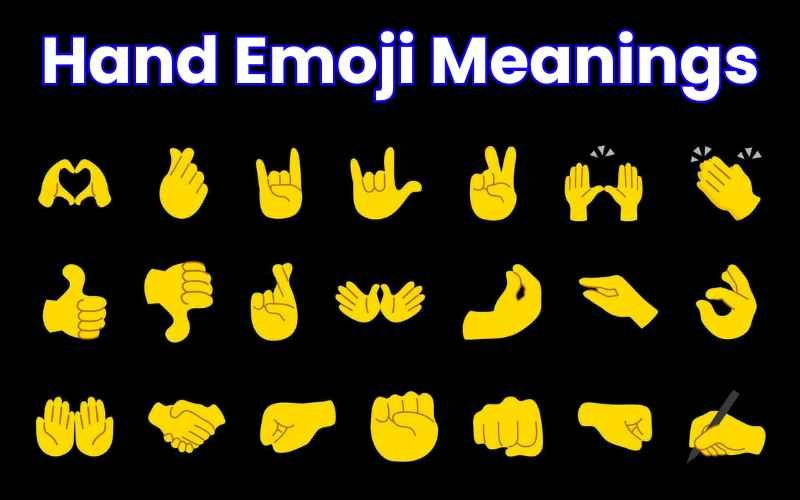Welcome to our expansive exploration into the fascinating world of hand emojis! In today’s digital era, emojis have become an integral part of our online communication, allowing us to convey emotions, reactions, and messages in a visually expressive way. Among the myriad of emojis available, hand emojis stand out for their versatility and rich symbolism. Let’s delve deeper into the meanings behind these expressive gestures and how they shape our digital interactions.
Meaning of Hand Emojis in the Digital World

👋 Waving Hand: The universal symbol of greeting, the waving hand emoji is used to say hello or goodbye in a friendly manner. It’s often accompanied by a cheerful message or as a gesture of acknowledgment.
🤝 Handshake: Symbolizing agreement, cooperation, or a deal, the handshake emoji is commonly used in professional contexts or to seal a virtual agreement between friends.
✌️ Victory Hand: This iconic gesture signifies victory, peace, or simply saying “peace out.” It’s a versatile emoji that can convey a sense of triumph, solidarity, or positivity.
👍 Thumbs Up: A classic symbol of approval, agreement, or encouragement, the thumbs up emoji is a quick and effective way to show support or approval in digital conversations.
👎 Thumbs Down: Conversely, the thumbs down emoji is used to express disapproval, disagreement, or disappointment. It’s a straightforward way to communicate a negative sentiment without the need for words.
🤞 Crossed Fingers: When words alone aren’t enough to express hope, optimism, or a wish for good luck, the crossed fingers emoji comes to the rescue. It’s often used in anticipation of a positive outcome or as a gesture of support.
👌 OK Hand: The OK hand emoji is a versatile gesture that can convey agreement, satisfaction, or perfection. It’s commonly used to signal that everything is good or to express approval.
🤟 Love-You Gesture: Also known as the “I love you” hand sign, this emoji represents affection, love, or a heartfelt message. It’s a powerful way to express emotions and strengthen connections in digital communication.
🤲 Palms Up Together: This emoji depicts two hands pressed together with palms facing up, symbolizing prayer, gratitude, or asking for a favor. It’s often used to convey sincerity, humility, or a request for support.
👐 Open Hands: The open hands emoji represents openness, honesty, or a welcoming attitude. It can also symbolize giving, receiving, or letting go, depending on the context of the conversation.
In conclusion, hand emojis play a significant role in shaping our digital communication, allowing us to express a wide range of emotions, gestures, and intentions with just a few taps of the keyboard. Whether it’s conveying greetings, emotions, agreements, or expressions of love, these versatile emojis add depth and richness to our online interactions. So next time you’re texting or messaging someone, consider incorporating hand emojis to enhance your communication and add a personal touch to your conversations. Happy emoji-ing! 🌟
Extended list of 50 popular hand emojis used in the digital world:
- 👋 Waving Hand
- 🤝 Handshake
- ✌️ Victory Hand
- 👍 Thumbs Up
- 👎 Thumbs Down
- 🤞 Crossed Fingers
- 👌 OK Hand
- 🤟 Love-You Gesture
- 🤲 Palms Up Together
- 👐 Open Hands
- 🙏 Folded Hands (Prayer)
- 🤲 Palms Together
- 🖐️ Raised Hand with Fingers Splayed
- ✋ Raised Hand
- 🖖 Vulcan Salute
- 🤙 Call Me Hand
- 🤘 Sign of the Horns
- 🖕 Middle Finger
- 🤚 Raised Back of Hand
- 🤏 Pinching Hand
- ✊ Raised Fist
- 👊 Oncoming Fist
- 👏 Clapping Hands
- 🙌 Raising Hands
- 🤝 Handshake (Alternate)
- 🤚 Raised Hand with Fingers Splayed
- 🖐️ Hand with Fingers Splayed
- 🖖 Live Long and Prosper
- 🤌 Pinched Fingers
- 🤏 Pinching Hand (Alternate)
- 👐 Open Hands (Alternate)
- 🙌 Person Raising Hands
- 🤲 Palms Up Together (Alternate)
- 👍 Thumbs Up (Alternate)
- 👎 Thumbs Down (Alternate)
- ✌️ Victory Hand (Alternate)
- 👊 Fist Bump
- 🤝 Handshake (Variant)
- 🤲 Hand with Index Finger and Thumb Crossed
- 🤜 Right-Facing Fist
- 🤛 Left-Facing Fist
- 🤚 Raised Back of Hand (Alternate)
- 🤟 Love-You Gesture (Alternate)
- 🤞 Crossed Fingers (Alternate)
- 🤏 Pinching Hand (Alternate)
- 🤙 Call Me Hand (Alternate)
- 🤘 Sign of the Horns (Alternate)
- 🖕 Middle Finger (Alternate)
- 🖖 Vulcan Salute (Alternate)
- 🤏 Pinching Hand (Alternate)
These hand emojis offer a diverse range of gestures, expressions, and meanings, enriching digital communication with visual cues and emotional depth.
FAQs Related to Hand Emojis in the Digital World
Some frequently asked questions related to hand emojis in the digital world, along with concise answers:
1. **What does the 👋 waving hand emoji mean?**
The 👋 waving hand emoji is commonly used to say hello or goodbye in digital conversations. It’s a friendly gesture that conveys acknowledgment or greeting towards someone.
2. **When should I use the 🤝 handshake emoji?**
The 🤝 handshake emoji symbolizes agreement, cooperation, or a deal. It’s often used in professional contexts or to seal a virtual agreement between friends.
3. **What does the ✌️ victory hand emoji signify?**
The ✌️ victory hand emoji is a symbol of victory, peace, or simply saying “peace out.” It conveys a sense of triumph, solidarity, or positivity in digital interactions.
4. **Is there a difference between 👍 thumbs up and 👎 thumbs down emojis?**
Yes, the 👍 thumbs up emoji is used to express approval, agreement, or encouragement, while the 👎 thumbs down emoji signifies disapproval, disagreement, or disappointment in digital conversations.
5. **Can the 🤞 crossed fingers emoji be used for luck?**
Absolutely! The 🤞 crossed fingers emoji is often used to express hope, optimism, or a wish for good luck in various situations. It’s a gesture of anticipation for a positive outcome.
6. **What does the 👌 OK hand emoji mean?**
The 👌 OK hand emoji is a versatile gesture that conveys agreement, satisfaction, or perfection. It’s commonly used to signal that everything is good or to express approval in digital communication.
7. **How do I express love with hand emojis?**
You can use the 🤟 love-you gesture emoji to express affection, love, or a heartfelt message in digital conversations. It’s a powerful way to convey emotions and strengthen connections with others.
8. **What’s the significance of the 🤲 palms up together emoji?**
The 🤲 palms up together emoji symbolizes prayer, gratitude, or asking for a favor in digital communication. It’s often used to convey sincerity, humility, or a request for support from others.
9. **When should I use the 👐 open hands emoji?**
The 👐 open hands emoji represents openness, honesty, or a welcoming attitude in digital conversations. It can also symbolize giving, receiving, or letting go, depending on the context of the interaction.
10. **Can hand emojis be misinterpreted?**
While hand emojis are versatile tools for digital expression, their meanings can sometimes be misinterpreted depending on cultural differences or context. It’s important to consider the context and tone of the conversation to ensure clarity in communication.
11. **How do I use the 🤙 call me hand emoji effectively?**
The 🤙 call me hand emoji is perfect for suggesting a phone call or indicating that you’re available for a chat. It’s a casual and friendly way to initiate or respond to conversations where a call might be appropriate.
12. **What’s the significance of the 🖕 middle finger emoji?**
The 🖕 middle finger emoji is a vulgar gesture used to express strong disapproval, frustration, or contempt. It’s important to use this emoji with caution, as it can be perceived as offensive in many contexts.
13. **When should I use the 🖖 Vulcan salute emoji?**
The 🖖 Vulcan salute emoji is a gesture popularized by Star Trek fans to represent the Vulcan greeting and the concept of “live long and prosper.” It’s often used as a friendly and geeky way to say hello or goodbye.
14. **Can hand emojis be used in formal communication?**
While hand emojis are typically used in casual digital conversations, they can sometimes be appropriate in informal or lighthearted professional settings. However, it’s essential to gauge the tone and context of the conversation before incorporating emojis into formal communication.
15. **Are there variations of hand emojis for different skin tones?**
Yes, many hand emojis, including 👍 thumbs up and ✌️ victory hand, have variations with different skin tones to promote diversity and inclusivity in digital communication. Users can choose the skin tone that best represents them or the message they want to convey.
16. **How do I access different skin tones for hand emojis?**
Most platforms and messaging apps offer the option to select different skin tones for hand emojis. Users can usually access these variations by long-pressing or clicking on the emoji to reveal a menu of skin tone options.
17. **Can hand emojis be used in combination with other emojis?**
Absolutely! Hand emojis can be combined with a wide range of other emojis to enhance their meaning or convey a specific message more effectively. For example, pairing a 👍 thumbs up with a 😊 smiling face can amplify the message of approval or encouragement.
18. **Are there any cultural considerations when using hand emojis?**
Yes, it’s essential to be mindful of cultural differences and potential interpretations when using hand emojis, especially in global digital communication. What may be a common gesture or symbol in one culture could have a different meaning or significance in another, so context and sensitivity are key.
19. **How do hand emojis contribute to non-verbal communication?**
Hand emojis play a significant role in non-verbal communication by adding layers of expression, emotion, and nuance to digital conversations. They can convey gestures, attitudes, and sentiments that enhance understanding and connection between users, even in the absence of spoken words.
20. **Can I suggest new hand emojis to be added to platforms?**
Yes, many platforms and organizations welcome suggestions for new emojis, including hand gestures, through official channels or feedback mechanisms. If you have an idea for a new hand emoji or any other emoji, you can reach out to the relevant authorities or participate in emoji proposal processes to advocate for its inclusion.

A detailed list of commonly used emojis along with their meanings. Table format for easy reference:
| Emoji | Name | Meaning/Usage |
|---|---|---|
| 😊 | Smiling Face with Smiling Eyes | Expresses happiness, warmth, and friendliness. |
| 😂 | Face with Tears of Joy | Indicates something is extremely funny or hilarious. |
| ❤️ | Red Heart | Represents love, affection, and romance. |
| 😍 | Smiling Face with Heart-Eyes | Used to show love, admiration, or adoration. |
| 😢 | Crying Face | Indicates sadness, hurt, or sympathy. |
| 😎 | Smiling Face with Sunglasses | Represents coolness, confidence, or nonchalance. |
| 😡 | Angry Face | Expresses anger, frustration, or annoyance. |
| 🥳 | Partying Face | Used to celebrate, show excitement, or mark a joyous occasion. |
| 🤔 | Thinking Face | Indicates deep thought, confusion, or considering something. |
| 🙏 | Folded Hands | Represents prayer, gratitude, or a request. Often used to say “please” or “thank you.” |
| 🥺 | Pleading Face | Conveys a cute, begging, or pleading expression. Often used to ask for favors. |
| 🤗 | Hugging Face | Represents a warm hug, comfort, or showing care. |
| 😴 | Sleeping Face | Indicates sleepiness or boredom. |
| 🤩 | Star-Struck | Expresses excitement, amazement, or admiration. |
| 🤤 | Drooling Face | Shows desire, craving, or attraction, often related to food or other things. |
| 😬 | Grimacing Face | Represents awkwardness, discomfort, or nervousness. |
| 🥰 | Smiling Face with Hearts | Shows affection, warmth, or being in love. |
| 😇 | Smiling Face with Halo | Indicates innocence, goodness, or playfulness. |
| 🙃 | Upside-Down Face | Conveys sarcasm, silliness, or playfulness. |
| 😍 | Heart Eyes Face | Used to show adoration or love, often for someone or something. |
| 🥵 | Hot Face | Indicates feeling hot, whether due to weather, attraction, or something intense. |
| 🥶 | Cold Face | Represents feeling cold, shivering, or icy conditions. |
| 🤯 | Exploding Head | Expresses shock, surprise, or mind-blowing information. |
| 😱 | Face Screaming in Fear | Indicates shock, horror, or extreme fear. |
| 😋 | Face Savoring Food | Shows delight in eating or something tasty. |
| 💔 | Broken Heart | Represents heartbreak, sadness, or the end of a relationship. |
| 🏆 | Trophy | Used to celebrate success, achievement, or victory. |
| 🌟 | Glowing Star | Represents excellence, magic, or something special. |
| 🌈 | Rainbow | Symbolizes hope, happiness, and positivity. Also used in LGBTQ+ contexts. |
| 🔥 | Fire | Indicates something is “hot,” trending, or impressive. |
| 💯 | 100 Percent | Used to show agreement, enthusiasm, or something that is absolutely correct. |
| 👏 | Clapping Hands | Expresses applause, appreciation, or encouragement. |
| ✌️ | Victory Hand | Represents peace, victory, or a positive outcome. |
| 💪 | Flexed Biceps | Indicates strength, encouragement, or “you can do it!” |
| 🧠 | Brain | Refers to intelligence, thinking, or mental activities. |
| 💡 | Light Bulb | Symbolizes a bright idea, inspiration, or innovation. |
| 📅 | Calendar | Represents dates, schedules, or events. |
| 📞 | Telephone Receiver | Indicates calling, communication, or wanting to talk. |
| 📷 | Camera | Refers to photography, taking pictures, or recording moments. |
| 🏃 | Running Person | Expresses activity, exercise, or the need to hurry. |
| 🕒 | Clock | Refers to time, punctuality, or deadlines. |
| ✈️ | Airplane | Represents travel, vacation, or flying. |
| 🚀 | Rocket | Indicates fast progress, ambition, or reaching new heights. |
| 🎉 | Party Popper | Used for celebration, parties, or festive occasions. |
| 💎 | Gem Stone | Symbolizes something valuable, rare, or precious. |
| 🌺 | Hibiscus | Represents beauty, nature, or tropical settings. |
| 🏖️ | Beach with Umbrella | Suggests vacation, relaxation, or a beach setting. |
| 🌞 | Sun with Face | Expresses a sunny, cheerful mood or warmth. |
| 🌧️ | Cloud with Rain | Indicates rainy weather or feeling down/sad. |
| ❄️ | Snowflake | Represents winter, coldness, or something delicate. |
| ⚡ | High Voltage | Used to show energy, speed, or something electrifying. |
| 🍎 | Red Apple | Symbolizes health, knowledge, or fruit. Often used for teachers. |
| 🍕 | Pizza | Refers to food, cravings, or a fun, casual meal. |
| 🍷 | Wine Glass | Indicates celebration, relaxation, or a night out. |
| 🎨 | Artist Palette | Represents creativity, art, or anything artistic. |
| 🎸 | Guitar | Symbolizes music, concerts, or a love for rock. |
| 🏆 | Trophy | Represents victory, achievement, or success. |
| 🔑 | Key | Indicates something important, access, or solutions. |
| 📚 | Books | Symbolizes learning, education, or reading. |
| 🏠 | House | Refers to home, comfort, or real estate. |
| 👩💻 | Woman Technologist | Represents technology, coding, or working on a computer. |
| 🧑🚀 | Astronaut | Symbolizes exploration, dreams, or reaching for the stars. |
| 🌍 | Globe Showing Europe-Africa | Represents Earth, global unity, or environmental awareness. |
| 🚦 | Traffic Light | Indicates rules, caution, or driving. |
| 💰 | Money Bag | Refers to wealth, business, or financial success. |
| 🧳 | Luggage | Suggests travel, packing, or moving. |
This table provides a variety of emojis, along with their names and common uses, to help you understand their meanings better. Each emoji can convey different emotions or actions, and their use can vary based on context and culture.









